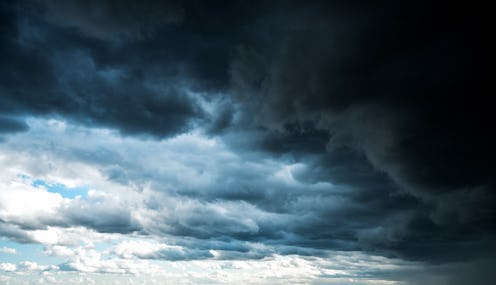News
When Will Tropical Storm Erika Hit Land?
Not quite smooth sailing — it's looking stormy over the Atlantic. Early on Monday, a tropical storm started brewing over the central Atlantic ocean, according to the Weather Channel. The fifth so far this season, the storm dubbed Erika may be a potential threat to land soon. But when will tropical storm Erika hit land? On Tuesday morning, the storm was about 640 miles east off the coast of Leeward Islands, a group of islands in the West Indies. The Washington Post reported that its winds were 45 miles per hour with gusts up to 60 miles per hour. Erika reportedly formed on the coast of Africa last Thursday, and has since moved across the ocean.
The tropical storm is now a possible threat to land-dwellers. The National Hurricane Center (NHC) has issued tropical storm watches for various islands including Montserrat, Antigua and Barbuda, Nevis, Anguilla, St. Maarten, Guadeloupe, St. Martin, and St. Barthelemy.
Looking to the future, the center predicts Tropical Storm Erika might soon reach land: "On the forecast track, the center of Erika will be near the Leeward Islands Wednesday night and early Thursday." The NHC continued that the storm may slowly grow stronger over the next two days, with the possibility of developing tropical storm conditions by Wednesday night or early Thursday morning.
Its unclear exactly where Erika will head next. Brian McNoldy, a cyclone researcher at the University of Miami's Rosenstiel School of Marine and Atmospheric Science, wrote in The Washington Post that if it continues, it could hit Florida on Sunday, and the Weather Channel warns that if the storm grows stronger, it could end up over northern New England or Canada. If Erika weakens, the Weather Channel says it may be pulled south and dissipate on land.
But, University of Miami's McNoldy points out that making a prediction is challenging — many forecasts disagree, and predict Erika's path with "low-confidence." He says that Erika will get to Leeward Islands Thursday, but after that, its up to speculation:
At that point, it could dissipate; continue to head west-northwest; or it could turn to the north and away from the U.S ... we will have to wait and see how the storm responds to the hostile environment, since models are notoriously bad at forecasting tropical cyclones in areas of high, often detrimental wind shear.
It looks as if we don't really know where Erika will end up, so both coastal and island dwellers should continue to monitor the situation as it unfolds.
Image: Fotolia
